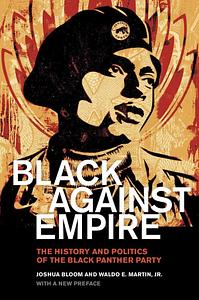Take a photo of a barcode or cover
166 reviews for:
Black against Empire: The History and Politics of the Black Panther Party
Joshua Bloom
166 reviews for:
Black against Empire: The History and Politics of the Black Panther Party
Joshua Bloom
challenging
informative
reflective
slow-paced
When I saw this title on the library bookshelf, it gave me pause. What did I really know about the Black Panthers really?
In grade school we learned about lynching, segregation, the Civil Rights Movement, the Montgomery Bus Boycott & Rosa Parks, Freedom Riders, Brown v. Board of Education, Martin Luther King, Jr., and then suddenly all that energy seemed to peter out, or at least was never mentioned again. I think we learned about Malcolm X and SNCC for half a second but burgeoning Black Power and Black nationalism didn’t get as much play as non-violence, integration, and assimilation.
Then there were the older (white) men in my family who spoke of Black Power and the Panthers disparagingly, the same way they did of ‘Women’s Lib’ and draft dodgers, so I had to assume the Panthers were righteous folks.
But other than that, I knew nothing.
This text was a much needed correction to the deficit in my knowledge. Focusing on the political history of the Panthers, the authors demonstrate how they were able to channel unrest, frustration, and anger into a compelling political and social program that served as the zeitgeist for a few short years, uniting anti-imperialists, anti-racists, and anti-war activists as well as moderate people throughout the United States.
It was deeply disturbing to read about how in some ways little has changed (ghettoization, police brutality) while other times I laughed aloud at how much had changed (the FBI illegally wiretapped Panther phones—ha! Today the NSA routinely illegally monitors our communications).
The authors don’t shy away from the negative aspects of the Panthers by in some regards do down play them: how armed self-defense attracted certain types people who didn’t work well within a hierarchy, less-than-revolutionary gender roles, Eldridge Cleaver admitting being a rapist in Soul on Ice, or how businesses were harassed into donating food for the free breakfast program, for example.
Overall, I found this volume to be illuminating and informative, full of excerpts from primary documents that helped explain the origins, ideology, and actions of the Black Panther Party.
In grade school we learned about lynching, segregation, the Civil Rights Movement, the Montgomery Bus Boycott & Rosa Parks, Freedom Riders, Brown v. Board of Education, Martin Luther King, Jr., and then suddenly all that energy seemed to peter out, or at least was never mentioned again. I think we learned about Malcolm X and SNCC for half a second but burgeoning Black Power and Black nationalism didn’t get as much play as non-violence, integration, and assimilation.
Then there were the older (white) men in my family who spoke of Black Power and the Panthers disparagingly, the same way they did of ‘Women’s Lib’ and draft dodgers, so I had to assume the Panthers were righteous folks.
But other than that, I knew nothing.
This text was a much needed correction to the deficit in my knowledge. Focusing on the political history of the Panthers, the authors demonstrate how they were able to channel unrest, frustration, and anger into a compelling political and social program that served as the zeitgeist for a few short years, uniting anti-imperialists, anti-racists, and anti-war activists as well as moderate people throughout the United States.
It was deeply disturbing to read about how in some ways little has changed (ghettoization, police brutality) while other times I laughed aloud at how much had changed (the FBI illegally wiretapped Panther phones—ha! Today the NSA routinely illegally monitors our communications).
The authors don’t shy away from the negative aspects of the Panthers by in some regards do down play them: how armed self-defense attracted certain types people who didn’t work well within a hierarchy, less-than-revolutionary gender roles, Eldridge Cleaver admitting being a rapist in Soul on Ice, or how businesses were harassed into donating food for the free breakfast program, for example.
Overall, I found this volume to be illuminating and informative, full of excerpts from primary documents that helped explain the origins, ideology, and actions of the Black Panther Party.
informative
reflective
medium-paced
a lengthy, well researched and detailed, fairhanded (largely positive but not uncritical) record and examination of the rise and eventual disillusion of political power held by the Black panther party. there's so much astounding power in the community organizing and influence documented here and some appalling abuses of power, from within and without (mostly without but again, this is not uncritical in its historical observations). I am in some ways most interested in the outcome of the entire work which looks at why and how political movements can a mask community and Collective action, why the Black panther party succeeded and failed when it did, and why based on these observations there are so few radical political revolutionary movements in the United States today
I will agree with reviewers who notes that the nonlinear timeline is at times heart not always clarifying when the narrative is circling back to an individual or, in the midst of so much information, is actually chronologically accurate but is detailing the start of a new chapter in a new location. this was compounded by listening on audio where you can't flip back to firm such thing easily.
I will agree with reviewers who notes that the nonlinear timeline is at times heart not always clarifying when the narrative is circling back to an individual or, in the midst of so much information, is actually chronologically accurate but is detailing the start of a new chapter in a new location. this was compounded by listening on audio where you can't flip back to firm such thing easily.
informative
I thought this was a gripping and balanced history of the Black Panther Party.
The authors make the case that after the Civil Rights victories of 1964 and 1965, the Black Panther Party formed to fight social and economic oppression that still affected Blacks in America. They also rode nascent Anti-War feelings about the Vietnam war.
The story is infuriating because state oppression to the BPP led to confirmed assassinations of Fred Hampton and Mark Clark. The government persecution of the BPP was wrong and really didn't harm the organization.
What ended up harming the organization was changes in how the US fought the Vietnam war, changes in social programs, and improvements of black economic and political power. Once these happened, the BPP stopped being a unique threat as the vanguard revolutionary party and became a social Democratic Party.
Finally, the organization tore itself apart because three of the four leaders of the party were in and out of exile and prison. Once they were all free, there were at least four giant egos fighting over a dwindling pile of power and money.
I think the BPP was unique, because they were revolutionary and they failed at that, but their increased focus on black oppression resulted in enduring changes that improved public life for oppressed Americans.
Don't read this if you're a bigot or a fascist. Your brain might explode. Do read this if you the Black Panther Party has some kind of mystique for you. The mystique will be gone, but the truth is just as compelling.
The authors make the case that after the Civil Rights victories of 1964 and 1965, the Black Panther Party formed to fight social and economic oppression that still affected Blacks in America. They also rode nascent Anti-War feelings about the Vietnam war.
The story is infuriating because state oppression to the BPP led to confirmed assassinations of Fred Hampton and Mark Clark. The government persecution of the BPP was wrong and really didn't harm the organization.
What ended up harming the organization was changes in how the US fought the Vietnam war, changes in social programs, and improvements of black economic and political power. Once these happened, the BPP stopped being a unique threat as the vanguard revolutionary party and became a social Democratic Party.
Finally, the organization tore itself apart because three of the four leaders of the party were in and out of exile and prison. Once they were all free, there were at least four giant egos fighting over a dwindling pile of power and money.
I think the BPP was unique, because they were revolutionary and they failed at that, but their increased focus on black oppression resulted in enduring changes that improved public life for oppressed Americans.
Don't read this if you're a bigot or a fascist. Your brain might explode. Do read this if you the Black Panther Party has some kind of mystique for you. The mystique will be gone, but the truth is just as compelling.
informative
medium-paced
informative
medium-paced
challenging
dark
informative
sad
tense
slow-paced
If I don't finish a book I only give it one star. The book had good quotes and fact based storytelling but it also hammered the same points on repeat a lot.
Graphic: Gun violence, Racism, Murder
Minor: Misogyny, Rape, Sexual assault
Also in cases where police were brutal towards Panthers the descriptions are specific and thorough, but in the only one case where the Panther involved likely incited the situation the whole scene is glossed over in a few pages and a huge chapter dedicated to his release. I had to use wikipedia to figure out what actually happened that night. It turned me off of the whole book, which had been awesome up to that point about sharing the facts even when they were unpleasant.
informative
inspiring
medium-paced





